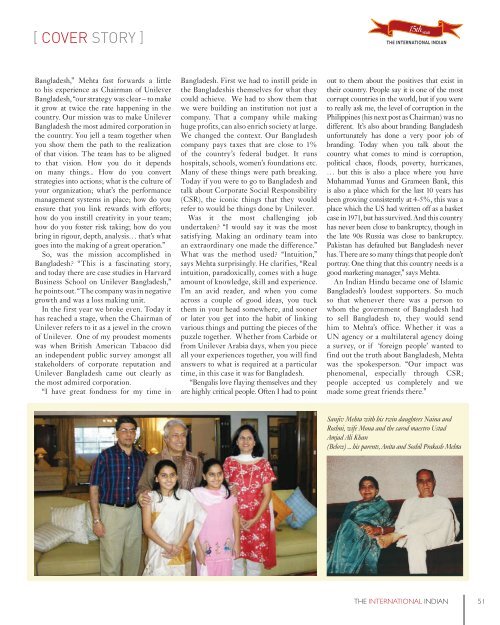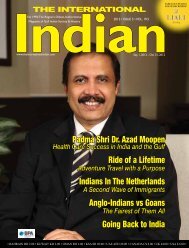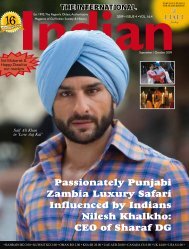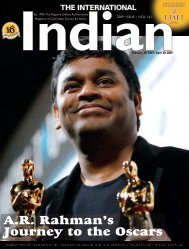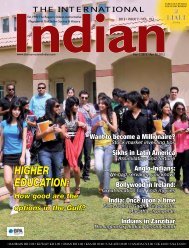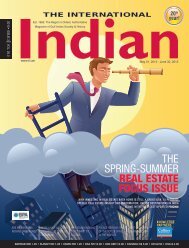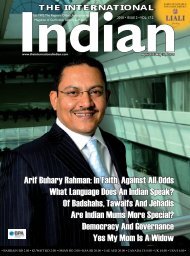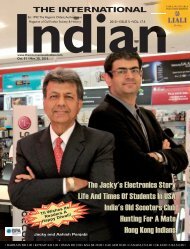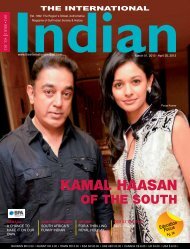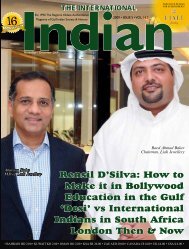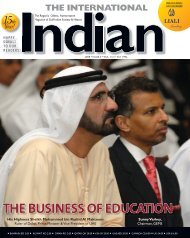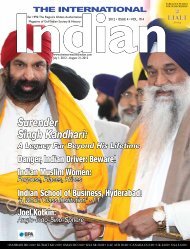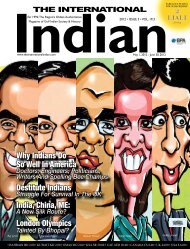THE INTERNATIONAL - International Indian
THE INTERNATIONAL - International Indian
THE INTERNATIONAL - International Indian
Create successful ePaper yourself
Turn your PDF publications into a flip-book with our unique Google optimized e-Paper software.
[ COVER STORY ]<br />
Bangladesh,” Mehta fast forwards a little<br />
to his experience as Chairman of Unilever<br />
Bangladesh, “our strategy was clear – to make<br />
it grow at twice the rate happening in the<br />
country. Our mission was to make Unilever<br />
Bangladesh the most admired corporation in<br />
the country. You jell a team together when<br />
you show them the path to the realization<br />
of that vision. The team has to be aligned<br />
to that vision. How you do it depends<br />
on many things... How do you convert<br />
strategies into actions; what is the culture of<br />
your organization; what’s the performance<br />
management systems in place; how do you<br />
ensure that you link rewards with efforts;<br />
how do you instill creativity in your team;<br />
how do you foster risk taking; how do you<br />
bring in rigour, depth, analysis… that’s what<br />
goes into the making of a great operation.”<br />
So, was the mission accomplished in<br />
Bangladesh? “This is a fascinating story,<br />
and today there are case studies in Harvard<br />
Business School on Unilever Bangladesh,”<br />
he points out. “The company was in negative<br />
growth and was a loss making unit.<br />
In the first year we broke even. Today it<br />
has reached a stage, when the Chairman of<br />
Unilever refers to it as a jewel in the crown<br />
of Unilever. One of my proudest moments<br />
was when British American Tabacoo did<br />
an independent public survey amongst all<br />
stakeholders of corporate reputation and<br />
Unilever Bangladesh came out clearly as<br />
the most admired corporation.<br />
“I have great fondness for my time in<br />
Bangladesh. First we had to instill pride in<br />
the Bangladeshis themselves for what they<br />
could achieve. We had to show them that<br />
we were building an institution not just a<br />
company. That a company while making<br />
huge profits, can also enrich society at large.<br />
We changed the context. Our Bangladesh<br />
company pays taxes that are close to 1%<br />
of the country’s federal budget. It runs<br />
hospitals, schools, women’s foundations etc.<br />
Many of these things were path breaking.<br />
Today if you were to go to Bangladesh and<br />
talk about Corporate Social Responsibility<br />
(CSR), the iconic things that they would<br />
refer to would be things done by Unilever.<br />
Was it the most challenging job<br />
undertaken? “I would say it was the most<br />
satisfying. Making an ordinary team into<br />
an extraordinary one made the difference.”<br />
What was the method used? “Intuition,”<br />
says Mehta surprisingly. He clarifies, “Real<br />
intuition, paradoxically, comes with a huge<br />
amount of knowledge, skill and experience.<br />
I’m an avid reader, and when you come<br />
across a couple of good ideas, you tuck<br />
them in your head somewhere, and sooner<br />
or later you get into the habit of linking<br />
various things and putting the pieces of the<br />
puzzle together. Whether from Carbide or<br />
from Unilever Arabia days, when you piece<br />
all your experiences together, you will find<br />
answers to what is required at a particular<br />
time, in this case it was for Bangladesh.<br />
“Bengalis love flaying themselves and they<br />
are highly critical people. Often I had to point<br />
out to them about the positives that exist in<br />
their country. People say it is one of the most<br />
corrupt countries in the world, but if you were<br />
to really ask me, the level of corruption in the<br />
Philippines (his next post as Chairman) was no<br />
different. It’s also about branding. Bangladesh<br />
unfortunately has done a very poor job of<br />
branding. Today when you talk about the<br />
country what comes to mind is corruption,<br />
political chaos, floods, poverty, hurricanes,<br />
… but this is also a place where you have<br />
Muhammad Yunus and Grameen Bank, this<br />
is also a place which for the last 10 years has<br />
been growing consistently at 4-5%, this was a<br />
place which the US had written off as a basket<br />
case in 1971, but has survived. And this country<br />
has never been close to bankruptcy, though in<br />
the late 90s Russia was close to bankruptcy.<br />
Pakistan has defaulted but Bangladesh never<br />
has. There are so many things that people don’t<br />
portray. One thing that this country needs is a<br />
good marketing manager,” says Mehta.<br />
An <strong>Indian</strong> Hindu became one of Islamic<br />
Bangladesh’s loudest supporters. So much<br />
so that whenever there was a person to<br />
whom the government of Bangladesh had<br />
to sell Bangladesh to, they would send<br />
him to Mehta’s office. Whether it was a<br />
UN agency or a multilateral agency doing<br />
a survey, or if ‘foreign people’ wanted to<br />
find out the truth about Bangladesh, Mehta<br />
was the spokesperson. “Our impact was<br />
phenomenal, especially through CSR;<br />
people accepted us completely and we<br />
made some great friends there.”<br />
Sanjiv Mehta with his twin daughters Naina and<br />
Roshni, wife Mona and the sarod maestro Ustad<br />
Amjad Ali Khan<br />
(Below) ... his parents, Anita and Soshil Prakash Mehta<br />
<strong>THE</strong> <strong>INTERNATIONAL</strong> INDIAN 51


